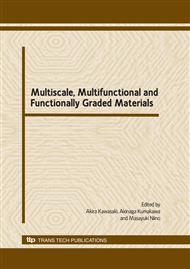p.225
p.231
p.239
p.245
p.253
p.259
p.265
p.273
p.279
Manufacturing of Functionally Graded Porous Products by Selective Laser Sintering
Abstract:
Selective laser sintering (SLS) is a rapid prototyping technique which is used to manufacture plastic and metal models. The porosity of the final product obtained by SLS can be controlled by changing the energy density level used during the manufacturing process. The energy density level is itself dependent upon manufacturing parameters such as laser power, hatching distance and scanning speed. Through mechanical characterization techniques, it is possible to quantitatively relate the energy density levels to particular strength values. The present study is directed towards manufacturing functionally graded polyamide products by changing the energy density level in a predetermined manner. The mechanical properties of the functionally graded components are characterized by means of tensile testing. Both homogeneous and functionally graded specimens are produced and tested in order to examine the influence of the energy density level on the mechanical response and on the ultimate tensile and rupture strengths. Selective laser sintering is shown to possess the potential to produce functionally graded porous specimens with controlled variations in physical and mechanical properties.
Info:
Periodical:
Pages:
253-258
Citation:
Online since:
October 2009
Authors:
Price:
Сopyright:
© 2010 Trans Tech Publications Ltd. All Rights Reserved
Share:
Citation:


